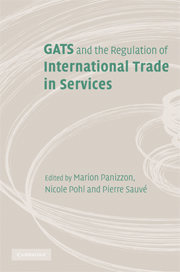Book contents
- Frontmatter
- Contents
- Contributors
- List of figures
- List of tables
- List of abbreviations
- Preface
- PART 1 Beyond regulatory control and multilateral flexibility: Gains from a cosmopolitan GATS
- PART 2 Unexplored economic, political and judicial dimensions of GATS
- PART 3 The limits of request–offer negotiations: Plurilateral and alternative approaches to services liberalisation
- PART 4 GATS case law: A first assessment
- 10 Lessons learned from litigating GATS disputes: Mexico – Telecoms
- 11 From Periodicals to Gambling: A review of systemic issues addressed by WTO adjudicatory bodies under the GATS
- 12 Specificities of WTO dispute settlement in services cases
- 13 Can foreign investors in services benefit from WTO dispute settlement? Legal standing and remedies in WTO and international arbitration
- PART 5 Market access, national treatment and domestic regulation
- PART 6 Unfinished business: Safeguard and subsidy disciplines for services
- PART 7 Challenges to the scope of GATS and cosmopolitan governance in services trade
- PART 8 Conclusion
- Index
- References
11 - From Periodicals to Gambling: A review of systemic issues addressed by WTO adjudicatory bodies under the GATS
from PART 4 - GATS case law: A first assessment
Published online by Cambridge University Press: 03 September 2009
- Frontmatter
- Contents
- Contributors
- List of figures
- List of tables
- List of abbreviations
- Preface
- PART 1 Beyond regulatory control and multilateral flexibility: Gains from a cosmopolitan GATS
- PART 2 Unexplored economic, political and judicial dimensions of GATS
- PART 3 The limits of request–offer negotiations: Plurilateral and alternative approaches to services liberalisation
- PART 4 GATS case law: A first assessment
- 10 Lessons learned from litigating GATS disputes: Mexico – Telecoms
- 11 From Periodicals to Gambling: A review of systemic issues addressed by WTO adjudicatory bodies under the GATS
- 12 Specificities of WTO dispute settlement in services cases
- 13 Can foreign investors in services benefit from WTO dispute settlement? Legal standing and remedies in WTO and international arbitration
- PART 5 Market access, national treatment and domestic regulation
- PART 6 Unfinished business: Safeguard and subsidy disciplines for services
- PART 7 Challenges to the scope of GATS and cosmopolitan governance in services trade
- PART 8 Conclusion
- Index
- References
Summary
Introduction
The General Agreement on Trade in Services (GATS) broke new ground when it entered into force on 1 January 1995 as part of the Marrakesh Agreement Establishing the World Trade Organization (WTO Agreement). It put in place a set of disciplines that now regulates trade in services among close to 150 countries. GATS negotiators faced a significant challenge when having to craft a comprehensive set of disciplines in this area. Trade in services is complex, in particular due to the various forms of delivery that are involved and the extensive nature of regulation in many sectors, for instance, financial services and professional services. Disciplines also often had to be developed anew.
The result is somewhat complex. Some obligations, in particular the most-favoured-nation treatment (MFN) obligation, apply to any measure affecting trade in services. Others, like the market access and national treatment obligations, apply only in respect of service sectors or sub-sectors (hereinafter ‘sectors’) of a Member's choosing. There is overlap between the market access and national treatment obligations, and the relationship between these two disciplines and those on domestic regulation is not clearly established. Additional obligations have been adhered to on a voluntary basis, in particular those contained in the Reference Paper on basic telecommunications services and the Understanding on Commitments in Financial Services. In general, the interpretation and understanding of Members’ Schedules of Specific Commitments (‘Schedules’) proves to be a laborious exercise.
This provides fertile ground for difficult and often sensitive interpretive issues to arise.
- Type
- Chapter
- Information
- GATS and the Regulation of International Trade in ServicesWorld Trade Forum, pp. 236 - 275Publisher: Cambridge University PressPrint publication year: 2008
References
- 5
- Cited by

